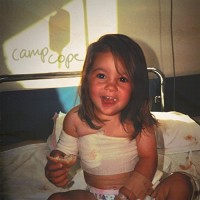I have this friend from Australia, my favorite person on the continent, someone I respect and admire greatly in, well, all aspects of life; and when this person tells me to check out a band from their homeland, I get excited. Two of the top recommendations have been the now defunct (and notoriously tricky to google, bah, artistic ellipses) ...Like Alaska and perhaps the best band in modern punk, The Smith Street Band, so when the name Camp Cope came up, anticipation started to brew. I listened to the single “Lost (Season One)†and was hooked.
I can’t count the number of times I’ve listened to the song since, stuck in my head, the drifting, floating guitar, lead vocalist Georgia Maq --excellent solo singer-songwriter in her own right-- bellowing and hanging on the endnote of how many aspects people can feel physically and mentally lost. Beautifully sad, but ends with a shred of hope, a crowd-pleasing “Nothing With Youâ€-esque lyric, “I wanna be losers forever, drink coffee in bed together, and not talk to anyone and figure out what it is that we had lost.â€
The rest of Camp Cope is equally rewarding. Each song is a journey, some filled with hardships, others with angst, and even a few cases of optimism. “Done†begins letter exchanging of dispute and depression, with ultimate fleeting. “Flesh and Electricity†tries to find value in the day-to-day, self, and human experience among a draining numbness.
Storytelling quality is a strongsuit, you’re left clinging to Maq’s words, even though chances are they will be soul crushing. Sensibility finds a close connection with previously mentioned fellow Australian artists Jen Buxton (...Like Alaska) and Wil Wagner (Smith Street Band), often rising and falling songwriting, a tremendous build up, crashing, and reconstruction, with one of varying tempo, anger, vocal stress, or in “West Side Story’s†case, all three. In this sense, one could also draw comparisons to Hop Along, especially contextual gravity and Maq’s breaking, stressing vocals.
Fighting frustration and the absurd, negative actions of the male-dominated society towards women, “Jet Fuel Can’t Melt Steel Beams†ads sharp, biting commentary, including the chorus, “The only thing that stops a bad man with a gun is a good man with a gun. The lies they use to control you.†Everyday annoyances and anxieties are addressed on “Stove Lighter;†are people acting negatively, or is it mental illness’ interpretation? Either way, the pain is present and felt through the music.
